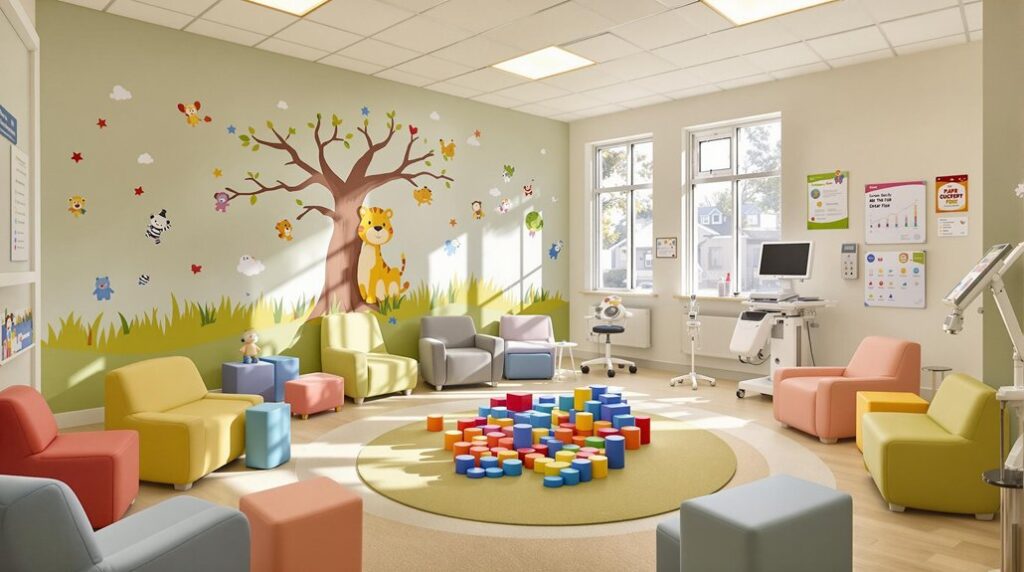A pediatric medical home isn’t a physical house – it’s a thorough healthcare approach where your child receives coordinated care from a dedicated team of providers. You’ll work with a primary care physician who leads a team focused on your family’s needs, including preventive care, specialist referrals, and community resources. Your child’s medical home offers continuous access to care, family education, and personalized support. Discover how this model can transform your child’s healthcare experience.
The Core Principles of a Pediatric Medical Home
While the concept of medical homes has evolved over time, the pediatric medical home operates on several fundamental principles that guide high-quality care delivery.
You’ll find that these principles emphasize thorough, coordinated care centered on both the child and family’s needs.
At its core, a pediatric medical home guarantees continuous access to a primary care team that meets strict accessibility standards.
You’re partnering with healthcare providers who deliver evidence-based care while maintaining cultural sensitivity.
Family engagement stands as a cornerstone, actively involving parents and caregivers in decision-making processes.
The medical home team coordinates with specialists, schools, and community resources to create an integrated care network.
They’re committed to measuring outcomes, maintaining quality standards, and constantly improving their services to deliver the best possible care for your child.
The team provides comprehensive support for complex respiratory issues and other specialized medical needs to ensure children receive optimal care in their home environment.
Benefits for Children and Their Families
When families participate in a pediatric medical home model, they experience numerous tangible benefits that enhance their child’s healthcare journey.
You’ll find that family engagement becomes a cornerstone of your child’s care, as you’re actively involved in decision-making and treatment planning. Your child receives holistic care that addresses not just medical needs, but also emotional, social, and developmental concerns.
Family involvement and comprehensive care work together to support your child’s complete health journey – physically, emotionally, and socially.
You’ll have a dedicated team that knows your child’s history, reducing the need to repeat information at each visit. This coordinated approach means you’ll spend less time managing appointments and paperwork, and more time focusing on your child’s well-being.
Through the medical home model, you’ll also gain access to community resources, specialists, and support services that can help your child thrive. Similar to Focus Family Care’s comprehensive care coordination, families receive personalized support navigating healthcare services and accessing needed resources.
How Care Coordination Works in a Medical Home
Care coordination serves as the backbone of the pediatric medical home, transforming these benefits into practical, day-to-day support for your family.
Through care continuity and effective communication strategies, your child’s medical home team guarantees seamless healthcare delivery across all settings and providers.
- Your care coordinator helps schedule appointments, managing referrals and follow-ups with specialists while keeping your primary care provider informed.
- You’ll receive proactive support through regular check-ins, health monitoring, and preventive care reminders.
- The team uses secure messaging systems and patient portals to maintain open lines of communication between you and your child’s healthcare providers.
- Your coordinator helps you navigate insurance, access community resources, and connect with support services that enhance your child’s overall well-being.
For families from diverse backgrounds, our multilingual care team ensures clear communication and culturally sensitive support throughout the coordination process.
The Role of Primary Care Physicians and Healthcare Teams
Three key players form the cornerstone of your child’s medical home team: the primary care physician (PCP), nurse practitioners, and support staff.
Your PCP leads the team, providing thorough medical oversight and coordinating your child’s overall health needs. They’ll develop personalized care plans and make referrals to specialists when needed.
Nurse practitioners work closely with your PCP, offering direct patient care, health education, and preventive services. They’re often your first point of contact for routine check-ups and immediate health concerns.
Support staff, including medical assistants and care coordinators, guarantee smooth healthcare collaboration by managing appointments, maintaining records, and facilitating communication between providers.
Together, this integrated team approach guarantees your child receives consistent, high-quality primary care while maintaining strong relationships with trusted healthcare professionals who know your family’s needs.
For medically fragile children, the team provides specialized pediatric home care services that allow them to receive expert medical attention in their own home environment.
Key Services and Support Features
Medical homes deliver a thorough suite of services designed to support your child’s physical and developmental needs.
The key services and support features you’ll find create a complete system of care that addresses your child’s unique requirements.
A comprehensive framework of medical services and support ensures personalized care tailored to meet each child’s individual health needs.
- Regular wellness visits, immunizations, and preventive screenings to monitor your child’s growth and development while catching potential health issues early.
- Care coordination that connects you with specialists, therapists, and community resources when your child needs additional support.
- After-hours availability and emergency guidance to guarantee you can reach healthcare providers when urgent concerns arise.
- Family education and support services that help you understand your child’s health conditions, manage medications, and make informed decisions about treatment options.
Similar to Florida Community Care Insurance, these medical homes focus on delivering personalized care plans that adapt to each child’s changing healthcare needs.
Making the Transition to a Medical Home Model
When choosing to shift your child to a medical home model, it’s essential to take thoughtful steps that guarantee a smooth transfer of care.
Start by researching potential medical home providers and evaluating their ability to meet your child’s specific needs. You’ll need to gather and organize all relevant medical records, including treatment histories and current medications.
Common shifts in care challenges include coordinating between multiple healthcare providers and guaranteeing continuous care during the changeover.
To address these issues, focus on implementation strategies such as scheduling a thorough initial visit, establishing clear communication channels with the new care team, and creating a detailed care plan.
You’ll want to maintain open dialogue with both your current and future providers to address any concerns and ensure all vital information transfers successfully.
Success Stories and Evidence-Based Outcomes
Research consistently demonstrates impressive outcomes for families who adopt the pediatric medical home model. Success metrics and patient testimonials highlight significant improvements in both healthcare delivery and patient satisfaction.
The pediatric medical home model delivers proven results, transforming healthcare quality and creating more satisfied families through coordinated, patient-centered care.
- You’ll see reduced emergency room visits and hospitalizations, with studies showing up to 40% fewer urgent care needs for children in medical homes.
- You’ll discover improved chronic disease management, particularly for conditions like asthma and diabetes, resulting in better long-term health outcomes.
- You’ll notice enhanced preventive care compliance, with immunization rates increasing by up to 25% among participating families.
- You’ll experience stronger parent-provider relationships, with 85% of families reporting greater confidence in their child’s healthcare management.
These evidence-based results demonstrate why medical homes have become the gold standard in pediatric care.
Conclusion
A pediatric medical home is much more than a building – it’s like having a caring team of experts wrapped around your family. Picture a place where doctors, nurses, and staff know your child by name and work together to keep them healthy and strong. Here, your child’s healthcare feels less like visiting a doctor’s office and more like being part of a caring family. Your medical team listens to your concerns, answers your questions, and creates a plan that works for your whole family.
Think of it as your child’s health headquarters, where everything they need is under one roof. Regular checkups, handling ongoing health issues, and emergency care all flow smoothly together. This means less stress for you and better care for your child.
You’re not alone on this journey. Our team at Focus Family Care stands ready to support you and your family every step of the way. We believe every child deserves care that makes them feel safe, understood, and valued.
If you or a loved one need help, don’t wait. Reach out to Focus Family Care today at (561) 693-1311 or email us at info@focusfamilycare.com.





